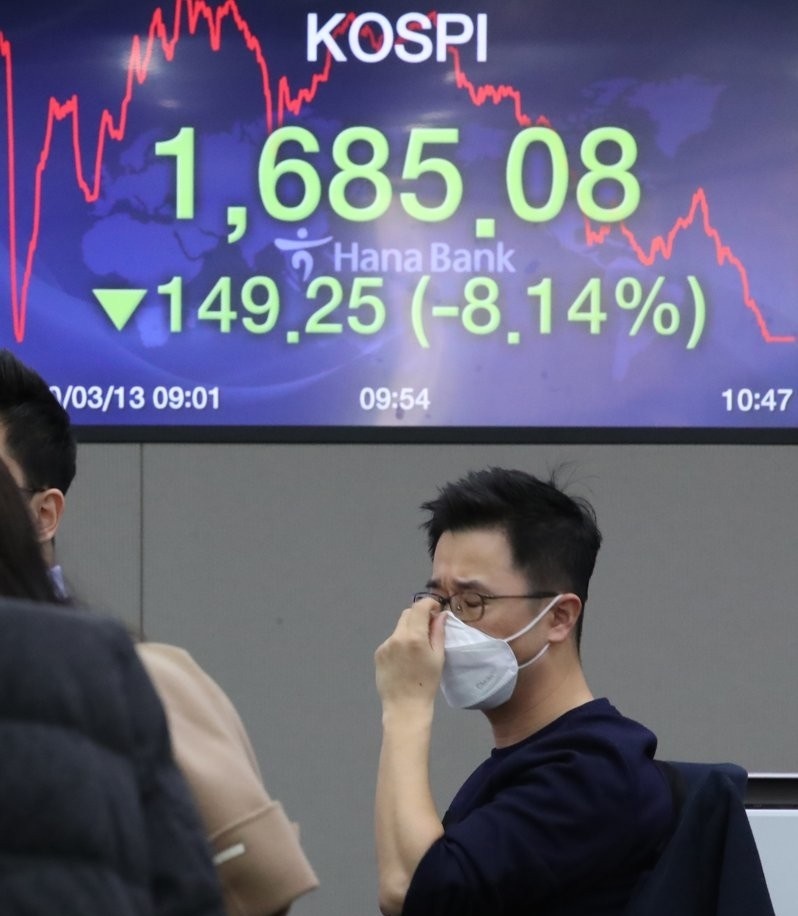[Market Close-up] COVID-19 accelerates shift in South Korea’s stock market landscape
Market value of mobile messenger giant Kakao surpasses Hyundai Motor; Naver, NcSoft also among top 10
By Kim Young-wonPublished : May 24, 2020 - 17:12

The ongoing coronavirus crisis appears to have accelerated changes in South Korea’s stock market landscape with contactless services and biotechnology firms breaking the dominance of manufacturing companies.
Twenty years ago, companies focusing on manufacturing or infrastructure businesses were among the 10 largest market cap companies on the main bourse Kospi. The list included auto giants Hyundai Motor and Kia Motors, steelmaker Posco and SK Telecom.
The emergence of online services providers and biotech companies in the market were anticipated in recent years with the talk of the “fourth industrial revolution” and the nation’s drive to seek new growth momentum.
But their rise in Korea’s stock market, approximately worth over 1,000 trillion won, has been propelled by, coincidently, the ongoing coronavirus pandemic, data suggests.
According to stock market operator Korea Stock Exchange, Naver and Kakao, along with biotech firms Samsung Biologics and Celltrion, made the list of top 10 market cap firms.
Kakao, in particular, saw its stock price hit a record high of 248,500 won ($200) on Friday. The company’s market value, based on the Friday closing price, stood at 21.5 trillion won -- the 10th highest in the local market. Outrun by the mobile messenger firm, Hyundai Motor, whose market value currently stands at 20.2 trillion won, has been forced out of the top 10 list.
This year alone, Kakao shares rose 60 percent. Although the stock price hit a low of 134,000 won on March 19, it rebounded to reach 247,000 won on May 22.
Kakao was ranked 22nd in terms of market value late last year, but advanced to the 18th place in late March and has climbed up the ranking since then.
The mobile messenger firm’s balance sheet also shined in the first three months. The operating profit soared by 219 percent on-year to 88.2 billion won while it posted a record quarterly revenue of 868.4 billion, up 23 percent year-on-year.
“Kakao achieved an encouraging first-quarter performance amid the coronavirus crisis,” said Lee Min-a, an analyst from local brokerage Daishin Securities. “It is too early to say the company is overvalued since its taxi-hailing service Kakao T Blue, and payment and banking services, including Kakao Pay and Kakao Bank, have great growth potential.”
In the first quarter, Kakao’s rival Naver started to solidify its presence in the stock market amid the pandemic.
Gaining traction amid the growing demand for non-face-to-face services, its market value jumped to 37.9 trillion won as of last Friday, up from 30.7 trillion won in 2019. Its operating profit rose 7.4 percent on-year to 221.5 billion won while its sales grew 14.6 percent to 1.7 trillion won. Naver, which first made the top 10 list in 2013, currently comes fourth in the domestic market.
Hyndai Motor, deemed as one of the biggest Kospi blue chips, on the other hand, has lost momentum as its car sales have dropped at a significant pace this year. Once competing with tech giant Samsung Electronics in terms of market value, the car manufacturer now comes 11th in the market cap race. Samsung is the only listed company that still remains in the top market cap list.
Meanwhile, the entire market value of listed companies around the world came in at $76.4 trillion as of May 21, up 24 percent from $61. 6 trillion on March 24 when it hit the lowest level this year, according to global financial news provider Bloomberg.
Zimbabwe’s stock exchange rose 73.92 percent during the same period followed by Sri Lanka and Argentina, which posted 66.7 percent and 66.8 percent, respectively. Korea took the 23rd place with 27.71 percent.
By Kim Young-won (wone0102@heraldcorp.com)

















![[KH Explains] Hyundai's full hybrid edge to pay off amid slow transition to pure EVs](http://res.heraldm.com/phpwas/restmb_idxmake.php?idx=652&simg=/content/image/2024/04/18/20240418050645_0.jpg&u=20240418181020)

![[Today’s K-pop] Zico drops snippet of collaboration with Jennie](http://res.heraldm.com/phpwas/restmb_idxmake.php?idx=642&simg=/content/image/2024/04/18/20240418050702_0.jpg&u=)